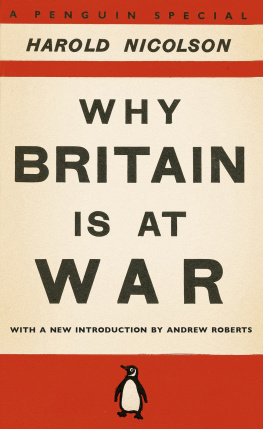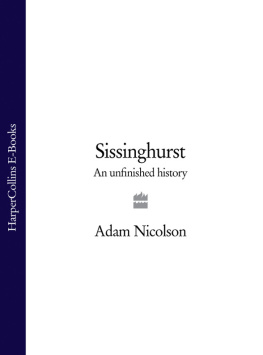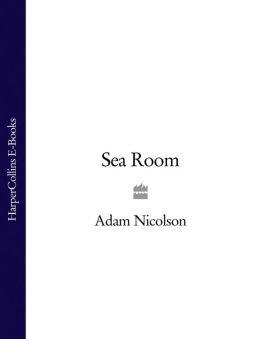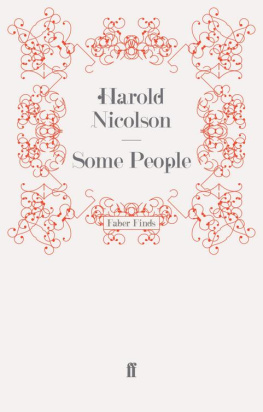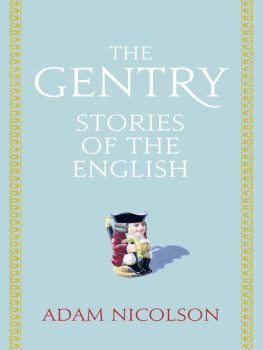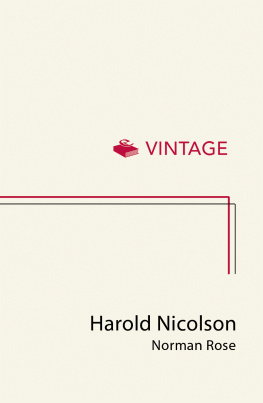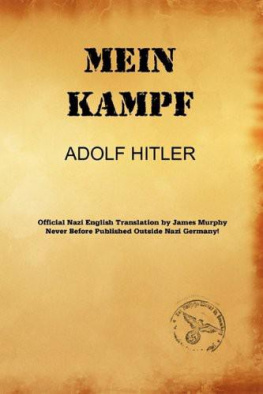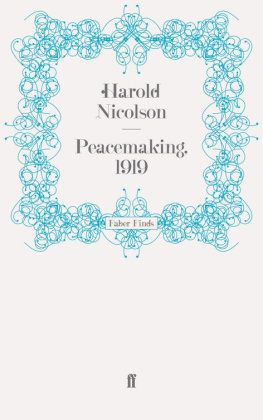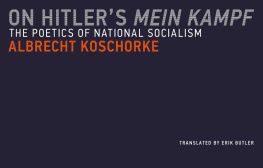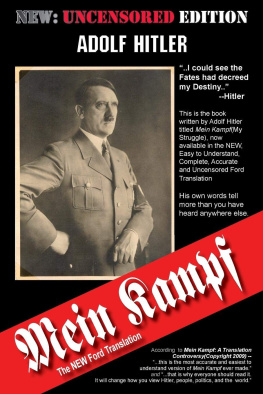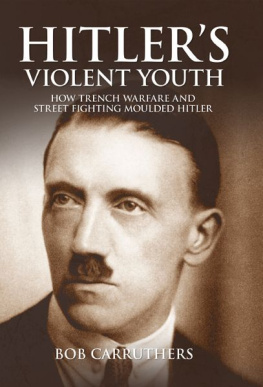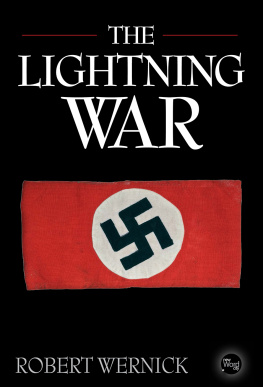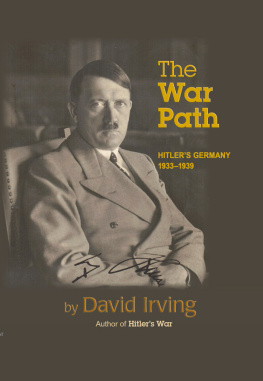Why Britain is at War
BY
HAROLD NICOLSON
With a new introduction by Andrew Roberts
PENGUIN BOOKS
PENGUIN BOOKS
Published by the Penguin Group
Penguin Books Ltd, 80 Strand, London WC2R 0RL , England
Penguin Group (USA) Inc., 375 Hudson Street, New York, New York 10014, USA
Penguin Group (Canada), 90 Eglinton Avenue East, Suite 700, Toronto, Ontario, Canada M4P 2Y3 (a division of Pearson Penguin Canada Inc.)
Penguin Ireland, 25 St Stephens Green, Dublin 2, Ireland
(a division of Penguin Books Ltd)
Penguin Group (Australia), 250 Camberwell Road, Camberwell, Victoria 3124, Australia
(a division of Pearson Australia Group Pty Ltd)
Penguin Books India Pvt Ltd, 11 Community Centre, Panchsheel Park, New Delhi 110 017, India
Penguin Group (NZ), 67 Apollo Drive, Rosedale, North Shore 0632, New Zealand
(a division of Pearson New Zealand Ltd)
Penguin Books (South Africa) (Pty) Ltd, 24 Sturdee Avenue, Rosebank, Johannesburg 2196, South Africa
Penguin Books Ltd, Registered Offices: 80 Strand, London WC2R 0RL , England
www.penguin.com
First published as a Penguin Special in Penguin Books 1939
Reissued in this edition 2010
Introduction copyright Andrew Roberts, 2010
All rights reserved
The moral right of the introducer has been asserted
Except in the United States of America, this book is sold subject to the condition that it shall not, by way of trade or otherwise, be lent, re-sold, hired out, or otherwise circulated without the publishers prior consent in any form of binding or cover other than that in which it is published and without a similar condition including this condition being imposed on the subsequent purchaser
ISBN: 978-0-14-196174-3
PENGUIN BOOKS
Why Britain is at War
Sir Harold Nicolson was an English diplomat, author, diarist and politician, and was married to the writer Vita Sackville-West. Books written by Nicolson include: Peacemaking, 1919 (1933), Curzon: The Last Phase (1934), The Congress of Vienna (1946), King George V (1952), Good Behaviour (1956), The Age of Reason (1961) and Kings, Courts and Monarchy (1962). His three-volume Diaries and Letters (19668) is a valuable document of British social and political life from 1930 to 1964. Harold Nicolson died in 1968.
Andrew Roberts is the bestselling author of The Storm of War (2009); Masters and Commanders (2008); and Hitler and Churchill: Secrets of Leadership (2003). He is one of Britains most prominent journalists and broadcasters.
Introduction
Sir Harold Nicolson (18861968) was a diplomat, author and politician who, for all his calm, civilized and rational exterior, was prey to profound passions. Why Britain is at War, a Penguin Special written on the outbreak of the Second World War, which soon became a bestseller, is a passionate and brilliantly sustained polemic against Nazism, but also against the appeasement of Hitler, against both of which Nicolson had bravely stood out during the 1930s. Equally passionate were his superbly written journals, which, in my view, constitute the finest British political diaries of the twentieth century. His homosexual passions, and the turbulent lesbian love affairs of his wife, the writer Vita Sackville-West, are well recounted in their son Nigels 1973 book Portrait of a Marriage.
Born in Tehran, the third son of Sir Arthur Nicolson (the 11th baronet and later 1st Baron Carnock), Harold Nicolson attended Wellington and then Balliol College, Oxford, passing the fiendishly hard Foreign Office exams in 1909. After serving in the Madrid and Constantinople embassies he was recalled to London, and it was he who delivered Britains declaration of war to the German embassy there. At the wars end he played a part during the Versailles Peace Conference in 1919, indeed when A. J. Balfour criticized David Lloyd George, Georges Clemenceau and President Woodrow Wilson as those three, all-powerful, all-ignorant, men sitting there and partitioning continents with only a child to take notes for them, Nicolson was that child. In 1920 Nicolson was appointed CMG for his efforts and promoted to First Secretary.
Postings at the League of Nations, as Counsellor at the Foreign Office and as charg daffaires at the Tehran and Berlin embassies followed, before Nicolson suddenly resigned from the service in September 1929. I am presented with a cactus, he wrote of his leaving party. It symbolizes the end of my diplomatic career. Some prosaic souls in the diplomatic service had failed to appreciate the books that he had written such as the witty Some People, published in 1927 and he also needed to earn more than his meagre stipend. Furthermore he wanted to see more of his beloved Vita, who had not joined him at either Tehran or Berlin.
On the left of politics, few would have predicted the next stage of his career, which was to work on the Londoners Diary column of Lord Beaverbrooks reactionary Evening Standard newspaper, a job he soon started to hate and which lasted only eighteen months. During that time he moved to Sissinghurst Castle in Kent, where he and his wife created one of Britains most beautiful gardens, and he also began to keep his daily diary.
In 1931 Nicolson entered politics, standing but losing the Combined Universities seat as a candidate for Sir Oswald Mosleys New Party. He also edited the partys weekly newspaper, Action. He left the party the following year when its underlying fascism became evident, and before it changed its name to the British Union of Fascists. Nicolsons utter loathing of fascism and dictatorship is clearly evident from Why Britain is at War. In the 1935 general election, he was elected to parliament as the National Labour candidate for Leicester West.
Throughout the 1930s Nicolson continued to write assured prose in highly regarded books such as Lord Carnock, People and Things, Peacemaking, 1919 (about the Versailles Conference), Curzon: The Last Phase, Helens Tower and Diplomacy and after Hitlers rise to power he resolutely opposed the appeasement policy adopted by the National Government he had been elected to support. He was one of the few MPs in the chamber of the House of Commons to refuse to stand up and cheer Neville Chamberlain when he announced that he would be flying to Munich to try to save the world from war in late September 1938.
On 25 September 1939, less than a month after the German invasion of Poland and Britains declaration of war, Allen Lane, the chairman and managing director of Penguin, commissioned Nicolson to write a Penguin Special of 50,000 words which would explain to the British people why war with Germany had been unavoidable, and must be won. His deep-rooted conviction that Hitler represented evil, recalled his son Nigel, could now be given full rein to a mass audience. First published on 7 November 1939, Why Britain is at War quickly sold 100,000 copies and went through three reprints by February 1940. There is a great deal in the book which will annoy the Government terribly, Nicolson warned the pro-appeasement Under-Secretary at the Foreign Office, Rab Butler, in mid-October 1939, but two months later Butler replied that the book is a work of art and perfectly correct. Anthony Eden also told Nicolson how he was very much in favour of my Penguin and has bought many copies.
The book was badly needed: Fascists, Communists and a large pacifist movement bitterly opposed the war, and between the surrender of Poland in October 1939 and Hitlers invasion of Norway and Denmark in April 1940 there was no military activity on the Western Front to distract public attention. It was being nicknamed the Phoney War and the Bore War, and many Britons were asking the question that the superbly direct title of Nicolsons book sought to answer. His use of high irony, low sarcasm and the telling phrase he describes Hitler as this lazy, feminine, unscrupulous but most remarkable man was ideally suited to the hour.

